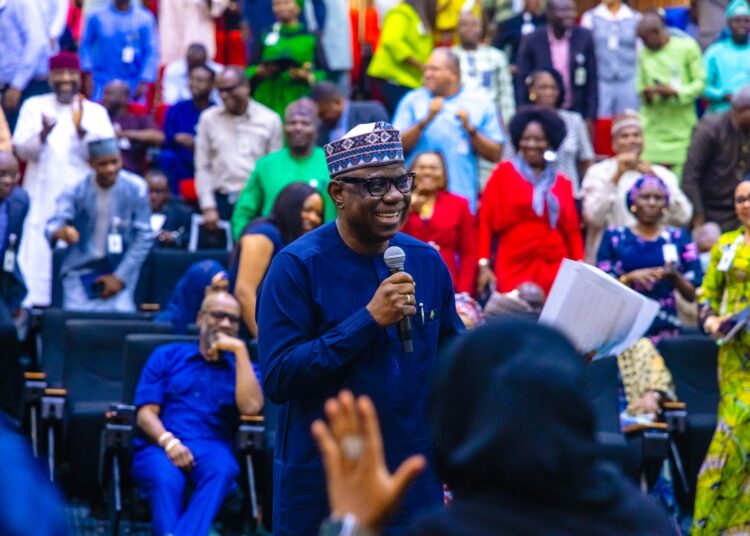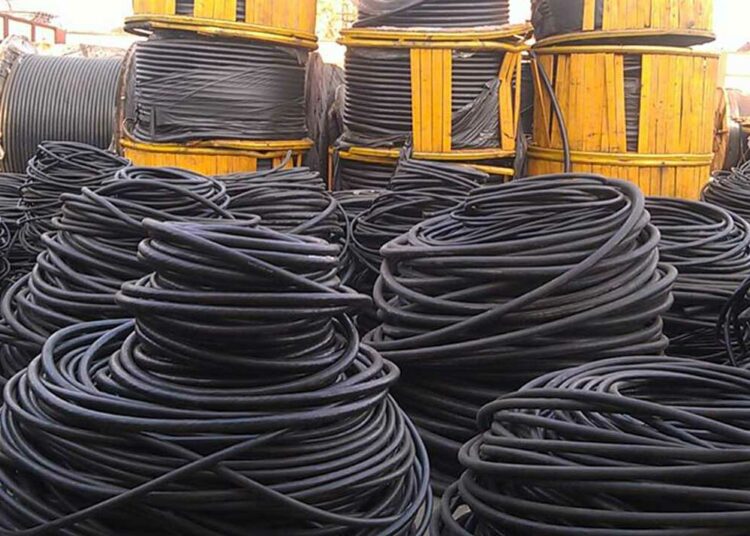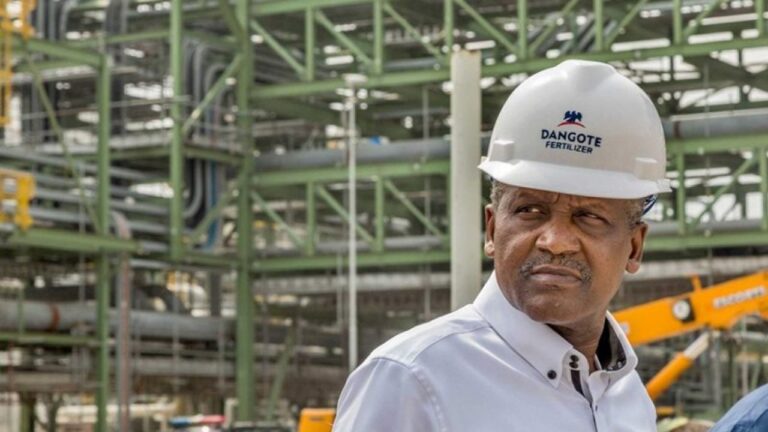
Dangote Petroleum Refinery and Petrochemicals has filed an application before the Federal High Court in Abuja to discontinue the suit it filed seeking to nullify the import licences issued by the Nigerian Midstream and Downstream Petroleum Regulatory Authority to the Nigerian National Petroleum Company Limited and several oil marketers for the importation of petroleum products.
This came as the Federal Government, in another development, praised the Dangote refinery for its engineering capacity and significant contributions to building local human capital, particularly among young Nigerian engineers.
The PUNCH had reported that Dangote Refinery, in an originating summons marked FHC/ABJ/CS/1324/2024, had asked the court to declare that NMDPRA violated Sections 317(8) and (9) of the Petroleum Industry Act by issuing licences for the importation of petroleum products.
The refinery argued that such licences should only be issued in cases of petroleum product shortfall and asked the court to hold that NMDPRA failed in its statutory duty under the PIA to encourage local refineries such as theirs.
The plaintiff (Dangote Refinery) in its Originating Summons dated September 6, 2024, sued NMDPRA, NNPCL, AYM Shafa Limited, A. A. Rano Limited, T. Time Petroleum Limited, 2015 Petroleum Limited, and Matrix Petroleum Services Limited as the 1st to 7th defendants respectively.
Dangote refinery asked the court to award N100bn in damages against NMDPRA for issuing import licences to oil marketers and permitting the importation of petroleum products. However, in a counter-affidavit dated November 5, 2024, filed by Ahmed Raji (SAN), three of the oil marketers—AYM Shafa Limited, A. A. Rano Limited, and Matrix Petroleum Services Limited—urged the court to dismiss the suit.
In their joint counter-affidavit, the marketers argued that granting Dangote Refinery’s application would be detrimental to Nigeria’s oil sector. They contended that the plaintiff aimed to monopolise the oil sector, allowing it sole control of supply, distribution, and pricing—an arrangement they described as a recipe for disaster.
They warned that granting Dangote Refinery a monopoly in the petroleum industry would eliminate competitive pricing, worsening the country’s already fragile economy. The marketers argued they are fully qualified to receive import licences from NMDPRA under Section 317(9) of the PIA.
They further explained that relying solely on Dangote Refinery as the producer and supplier of petroleum products would lead to continued price increases and jeopardise energy security. They stressed that if the refinery were to break down, the country would face a severe energy crisis due to the lack of alternative sources.
Meanwhile, in its response, NMDPRA informed the court that the current production capacity of Dangote refinery was insufficient to meet the country’s daily petroleum consumption needs. It said that oil import licences were issued to NNPCL and other marketers to address shortfalls in supply.
In a counter-affidavit deposed to by a Senior Regulatory Officer, Idris Musa, NMDPRA argued that Dangote Refinery was not entitled to the reliefs sought. He added that, in line with Section 317(9) of the PIA, the Authority issued import licences to companies with proven international trading records to bridge the supply gap.
Musa said the agency is mandated to promote competition and prevent monopolies, denying allegations of conspiracy against the plaintiff. The Authority maintained that denying other entities import licences based on Dangote Refinery’s production claims would harm competition, create a monopoly, and threaten the nation’s energy security.
It added that issuing multiple licences ensures fair competition, prevents abuse of dominant positions, and avoids monopolistic practices in the oil and gas sector. NMDPRA also noted that Dangote Refinery’s products were not restricted to the Nigerian market and could be sold globally.
It rejected claims of a “grand conspiracy” against Dangote Refinery, stating that the plaintiff had failed to provide any evidence in support of the allegation. In a preliminary objection, NNPCL, through its legal team led by Mr Kehinde Ogunwumiju (SAN), argued that the suit was incompetent and should be struck out for misidentification.
NNPC urged the court to strike out its name from the suit, insisting that the plaintiff lacked the locus standi (legal right) to seek such reliefs. The objection was supported by an affidavit dated March 18, 2025, deposed to by a litigation clerk in the law firm representing NNPC. The company also argued that Dangote Refinery had sued a non-existent entity.
However, Justice Inyang Ekwo dismissed the objection, ruling that the error in the name did not render the suit defective. The court held that the defendants ought to have responded to the substantive claims before raising procedural objections.
Subsequently, the plaintiff filed a motion to amend its originating summons to correct the misnomer, which the court granted on March 19. The court had fixed September 29 for the hearing of the suit before Justice Mohammed Umar.
However, in a notice of discontinuance signed by the plaintiff’s counsel, Ogwu Onoja (SAN), Dangote refinery withdrew the suit. The discontinuance notice read, “Take notice that the plaintiff herein discontinues this suit against the defendants forthwith.” No reason was disclosed in the application for the decision to withdraw the case.
Meanwhile, the Federal Government has praised the Dangote refinery for its engineering capacity and significant contributions to building local human capital, particularly among young Nigerian engineers.
This was contained in a statement by the Dangote Group on Tuesday. During a recent visit to the facility in Lagos, the Minister of Industry, Trade and Investment, Dr Jumoke Oduwole, commended the company’s dual focus on physical infrastructure and skills development.
“We are not just appreciating the scale of the infrastructure: the bricks, mortar, and pipelines. We are equally impressed by the investment in human capital. It is deeply inspiring to see young Nigerians, many of whom have never left the country, operating world-class equipment with remarkable skill and professionalism.”
Oduwole, who is also a university lecturer, said she was particularly struck by the technical competence of the young workforce. “As a lecturer myself, I take great pride in witnessing their excellence in engineering. It is nothing short of exceptional,” she added.
The minister also acknowledged the role of the President of Dangote Group, Aliko Dangote, in driving industrial investment in Nigeria. “Listening to Alhaji Dangote speak about this project is always a source of inspiration. This is not just a refinery; it is a bold statement of what is possible. This is Lagos, Nigeria, and there is truly nowhere else in the world with a facility of this kind at this scale.”
During the visit, the Vice President, Oil & Gas at Dangote Industries Limited, Edwin Devakumar, gave a presentation highlighting the refinery’s production capabilities.
According to Devakumar, the refinery produces Euro-V quality petrol, diesel, jet fuel, and polypropylene, meeting 100 per cent of Nigeria’s domestic demand for refined petroleum products, with surplus available for export.
He emphasised that the refinery incorporates the latest technologies to ensure environmental compliance while delivering clean, globally competitive fuels. “We are one of the very few companies in the world to have executed both a petroleum refinery and a petrochemical complex directly as an EPC contractor,” Devakumar said.
He explained that the refinery incorporates advanced technology for environmental compliance and includes a self-sufficient marine terminal for crude oil intake and product export.
The integrated power plant within the facility generates 435MW, comparable to the electricity demand of the Ibadan Electricity Distribution Company, which serves Oyo, Ogun, Osun, Kwara, and Ekiti states.
Devakumar also stated that about 60,000 skilled Nigerians were employed during the refinery’s construction phase. He said many of those trained by the company have gained international experience and are now working abroad, including in the United Arab Emirates.
The company’s approach to developing local engineers has drawn commendation from several professional bodies. The Nigerian Content Development and Monitoring Board recently acknowledged its role in youth development, while the League of Engineering Bodies in Nigeria—including the Nigerian Society of Engineers, the Nigerian Academy of Engineering, ACEN, and COREN—also praised the engagement of Nigerian professionals in the plant’s construction and operations.
The Dangote Petroleum Refinery, described as the world’s largest single-train refinery, is expected to reduce Nigeria’s reliance on imported fuel and boost economic activity through its integrated industrial operations.
SOURCE : PUNCH




